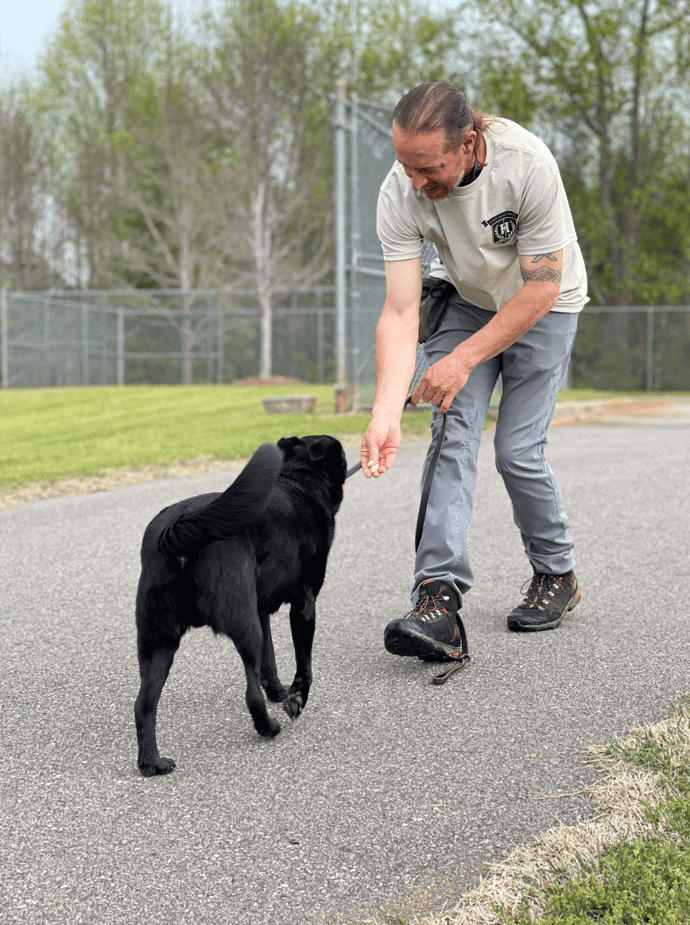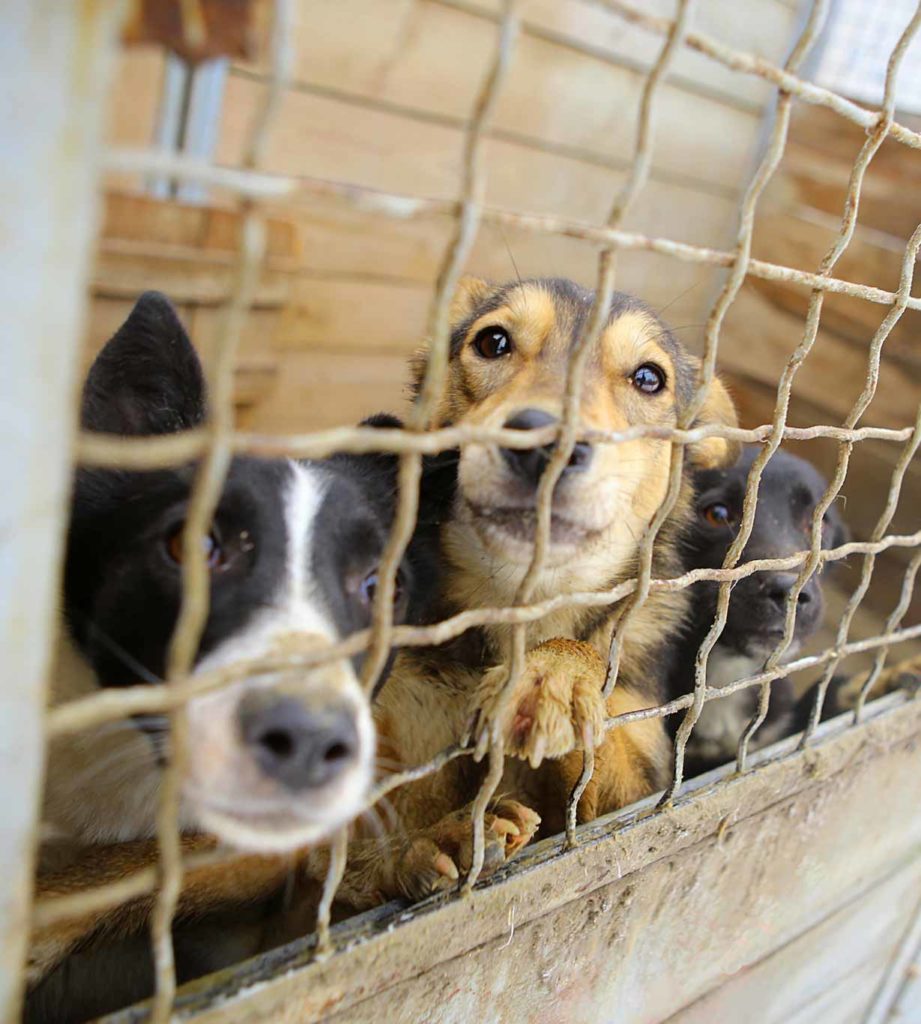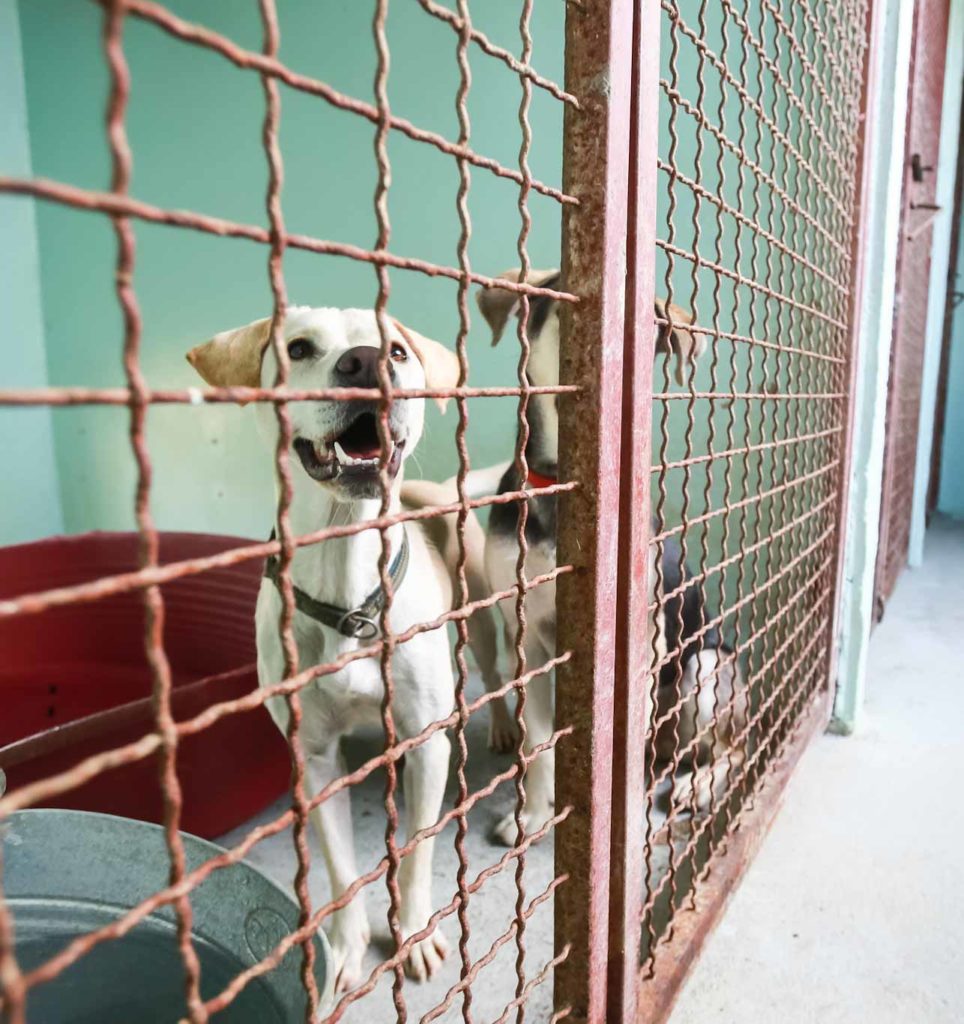
Since the beginning of our School for Dog Trainers over a decade ago, students have saved the lives of countless dogs. We pride ourselves on producing professional dog trainers that not only have the knowledge to accurately diagnose behavioral issues but also the practical skill to work with the dogs that a lot of industry leading trainers will not. Throughout their studies, students are taught to systematically diagnose and treat many different behavioral issues through hands on experience and intensive book-work. Students do not just learn to train dogs but also save lives. Students have adopted dogs in need of a home, they have played a large part in rehabilitating and training dogs in our second chance program, they have gone on to run successful rescue organizations, aided thousands of people through in-home lessons, and much more. The School for Dog Trainers students and graduates save shelter dog lives.
Dog Behavior Clinic
At every Master Dog Trainer program, we host a free-of-charge dog behavior clinic that is open to the public. Clients who sign up are assigned a time slot to come with their dog. This dog behavior clinic allows for people who are having behavioral issues with their dog to come in and explain their problem to the class. The client then gets feedback on what is happening with their dog and receives industry leading advice on how to go about fixing it. Our behavior clinic is also beneficial because it gives the opportunity for people to receive professional dog training help that may otherwise not be able to afford it.
Dog training, especially when dealing with behavioral issues, is expensive. A lot of people who are not able to afford training unfortunately end up surrendering their dog when issues they cannot personally fix arise.
Students, whether they realize it or not, save the lives of dogs before they even finish the course. In the past we have had students take on the responsibility of personally working with behavior clinic clients in order to solve their problem. We have been a last resort for a lot of dogs and have been able to give hope and guidance to these desperate dog owners.
This clinic is in large part entirely student run. A staff member is always there in case the students need guidance, but they are not there to interfere or run the show. It is up to the students to ask the right questions, come up with a diagnosis, and give appropriate advice. We find that it is incredibly beneficial for all parties involved; the students gain real-world experience working with clients and diagnosing behavioral issues on the fly, clients are able to get free advice from a class of dog trainers lead by industry leading instructors, and the dogs are kept out of shelters and in the homes of the people who love them.
ICAS Shelter Dog Program
One recent initiative our students have played a pivotal role in developing is our partnership with Iredell County Animal Services (ICAS).
Students at our Main Campus in North Carolina help socialize and teach basic obedience commands to dogs residing at the ICAS shelter. By helping build a solid foundation of behavior, the likelihood of dogs being successfully adopted out to new homes is increased.

Second Chance Program
At every Master Dog Trainer program, we host a free-of-charge dog behavior clinic that is open to the public. Clients who sign up are assigned a time slot to come with their dog. This dog behavior clinic allows for people who are having behavioral issues with their dog to come in and explain their problem to the class. The client then gets feedback on what is happening with their dog and receives industry leading advice on how to go about fixing it. Our behavior clinic is also beneficial because it gives the opportunity for people to receive professional dog training help that may otherwise not be able to afford it.
Dog training, especially when dealing with behavioral issues, is expensive. A lot of people who are not able to afford training unfortunately end up surrendering their dog when issues they cannot personally fix arise.
Students, whether they realize it or not, save the lives of dogs before they even finish the course. In the past we have had students take on the responsibility of personally working with behavior clinic clients in order to solve their problem. We have been a last resort for a lot of dogs and have been able to give hope and guidance to these desperate dog owners.
This clinic is in large part entirely student run. A staff member is always there in case the students need guidance, but they are not there to interfere or run the show. It is up to the students to ask the right questions, come up with a diagnosis, and give appropriate advice. We find that it is incredibly beneficial for all parties involved; the students gain real-world experience working with clients and diagnosing behavioral issues on the fly, clients are able to get free advice from a class of dog trainers lead by industry leading instructors, and the dogs are kept out of shelters and in the homes of the people who love them.

Our Second Chance Program takes homeless or otherwise undesirable dogs with behavior issues and through state-of-the-art training techniques, rehabilitates them to the point where they can be placed in a home. A lot of hard work goes into these dogs, some even going into specialized fields such as narcotics detection, others being adopted out as a pet dog. During the training process we will test dogs for working characteristics. If a dog has great hunt and ball drive, we might train them as a detection dog and donate them to a police department upon completion. Students during our courses get to work with the dogs in our Second Chance Program and take part in a large portion of their training. Students often get to see the dog’s transformation from arrival to the time they are ready to go home. Some students have even adopted dogs from the Second Chance Program after working with them so close.
Second Chance dogs come from a variety of locations, some are found running the streets, some are pulled from shelters just before they run out of time, and others have been surrendered by owners who just can’t handle their pet anymore. Regardless of where they came from, with the help of our students, and knowledgeable staff we are able to give them a second chance at a happy life.
Second Chance dogs are a group effort. Students get to work side-by-side with our expert staff of professional dog trainers to teach these dogs their basic obedience skills. Occasionally dogs that show favorable working characteristics are taught more specialized tasks. In other cases, correcting behavioral issues is no easy task and it takes a good amount of experience to get comfortable with doing it. Students have the opportunity to work with skilled instructors to correct complex behavioral issues. This creates a beneficial situation for both parties involved. The dog’s behavioral issues are remedied, allowing them to find a forever home and the students gain valuable information on how to correct these types of problems. There is no better way to gain experience then to be able to do it first hand with the guidance of a seasoned professional by your side.
Students Adopting Dogs
There have been many dogs that have come through the Second Chance Program that students have saved by personally adopting them. After working with these dogs so closely, frequently students will develop a strong connection with the dog and end up taking them home. Students are often times the perfect owners for these dogs because they can continue the dogs training for the life of the dog. Some of these dogs require long term structure and maintenance training due to specific behavioral problems. Our students become very invested in what is best for the dog they are working with and will often take on the responsibility of caring for them.
Applying Their Knowledge in Shelters

We have many students that attend our program work for shelters or rescue organizations in their home state. These students will take the industry leading knowledge they learn here and apply it to the dogs that reside in their kennels. Becoming proficient in effectively treating a variety of behavioral issues is something that only comes from experience. Throughout our courses students get hands on with a variety of dogs in order to gain experience in handling all different shapes and sizes of dog. There is no substitute for hands on learning, especially when it comes to working with animals. Our courses are designed to leave students feeling prepared to deal with a variety of dogs. Many graduates, with a sense of new-found confidence, have gone on to rehabilitate dogs that they were previously unable to. Graduates working in shelters have reported a higher adoption rate for dogs they have worked with since completing one of our courses. Shelter environments provide a unique challenge in that there is such a large variety of temperaments and personalities in such a small area. To an unexperienced trainer it may be overwhelming to deal with that many dogs in a single location especially if they do not have a lot of experience working with multiple types of dog personalities.
Approximately 6.5 million companion animals enter U.S. shelters each year, and more than half of these animals are dogs. According the ASPCA, behavioral issues are responsible for 47% of the dogs that are surrendered. Unfortunately, many dogs with easily fixable behavioral issues, are deemed “unable to be rehomed” due to the lack of experience and knowledge of the behavior consultants that have accessed the dog. It is estimated that 670,000 dogs are euthanized per year. This number can be drastically reduced. Working with dogs in shelters is crucial to making them more adoptable and sadly a majority of shelters do not have an onsite trainer to assist with their dogs. Most training that shelter dogs receive is from staff that knows how to teach a few obedience behaviors or from trainers that donate their time. When trying to find a home for a dog, making sure that they are well behaved is of the utmost importance.
Whether it be working with a behavioral issue that would otherwise make a dog very difficult to adopt, or just teaching them basic manners, having a trainer to work with them greatly increases their odds of finding a home. Thankfully in recent years we have seen a large drop in the number of animals being euthanized in shelters, but the surrender rate remains the same.
Preventing Dogs From Being Surrendered
As trainers we can remedy many issues dog owners have before the dog ends up in a shelter. By offering up to date and effective training methods to their clients, our graduates have the ability to save a dog before it has a chance to contribute to that 47%. Whether a client just got a new puppy or has adopted an older dog from a shelter, our graduates have the knowledge base to tackle any behavioral issue presented. Many new dog owners unfortunately do not have the patience or knowledge base to deal with minor issues like urinating in the house, nipping, or jumping. These easily fixable behaviors will often result in a new puppy being surrendered to a shelter. Most parents will not tolerate a puppy jumping and nipping their children for long. It is our job to step in and solve these issues before owners get to their breaking point and our graduates are more than equipped to do just that. Students learn how to interact with clients as well as effectively run a group class, these skills are vital to being successful in getting your point across to their future clients. Most issues clients have with their adult dogs can be easily prevented by teaching their puppy basic obedience behaviors. Most dog owners are not looking for them to jump through hoops, they only want their dog to have basic house manners and behave out in public. Our students are equipped to effectively work with their clients to achieve the desired results, which ultimately leads to less dogs being surrendered to shelters.
